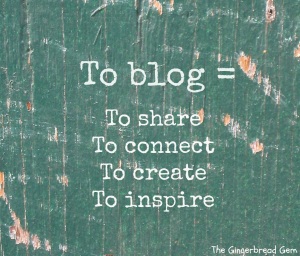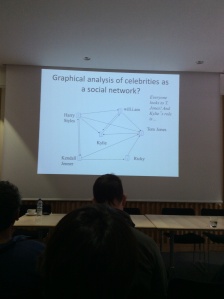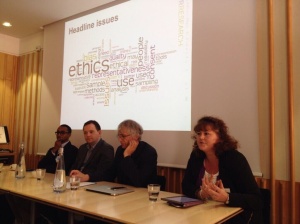 In October 2014 the NSMNSS network published its first ebook, a collection of over fifty blogs penned by researchers from around the world who are using social media in their social research. To the best of our knowledge this is the first book of blogs in the social sciences. It draws on the insights of experienced and well-known commentators on social media research through to the thoughts of researchers new to the field. In this post I reflect on the process of creating that book. A version of this post was also published on the NSMNSS blog.
In October 2014 the NSMNSS network published its first ebook, a collection of over fifty blogs penned by researchers from around the world who are using social media in their social research. To the best of our knowledge this is the first book of blogs in the social sciences. It draws on the insights of experienced and well-known commentators on social media research through to the thoughts of researchers new to the field. In this post I reflect on the process of creating that book. A version of this post was also published on the NSMNSS blog.
 Why did we choose to publish a book of blogs rather than a textbook or peer-reviewed article? In my view there is space in the academic publishing world for peer reviewed works and self-published books. We chose to publish a book of blogs rather than a traditional academic tome because we wanted to create something quickly which reflected the concerns and voices of our members. Creating a digital text, built on people’s experiences and use of social media seemed an obvious choice. Many of our network members were already blogging about their use of social media for research, for those who weren’t this was an opportunity to write something short and have their voices heard.
Why did we choose to publish a book of blogs rather than a textbook or peer-reviewed article? In my view there is space in the academic publishing world for peer reviewed works and self-published books. We chose to publish a book of blogs rather than a traditional academic tome because we wanted to create something quickly which reflected the concerns and voices of our members. Creating a digital text, built on people’s experiences and use of social media seemed an obvious choice. Many of our network members were already blogging about their use of social media for research, for those who weren’t this was an opportunity to write something short and have their voices heard.
Unlike other fields of social research, social media research is not yet populated with established authors and leading writers, the constant state of flux of the field means it is unlikely to ever settle in quite the same way as ethnography say or survey research. The tools, platforms and approaches to studying them are constantly changing. In this context works which are published quickly to continue to feed the plentiful discussions about the methods, ethics and practicalities of social media research seem an important counterpoint to more scholarly articles and texts.
How did we do it?
Step 1 – Create a call for action: We used social media channels to publicise the call for authors, posting tweets with links to the network blog which gave authors a clear brief on what we were looking for. Within less than a fortnight we had over 40 authors signed up.
Step 2 – Decide on the editorial control you want to have: We let authors know that we were not peer reviewing content, if someone was prepared to contribute we would accept that contribution unless it was off theme. In the end we used every submitted blog with one exception. This was an important principle for us, the network is member-led and we wanted this book to reflect the concerns of our members not those of an editor or peer-review panel. The core team at NatCen undertook light touch editing to formatting and spelling but otherwise the contributions are unadulterated. We also organised the contributions into themes to make it easier for readers to navigate.
Step 3 – Manage your contributions: We used Google Drive to host an author’s sign-up spreadsheet asking for contact information and also an indication of the blog title and content. We also invited people to act as informal peer reviewers. Some of our less experienced authors wanted feedback and this was provided by other authors. This saved time because we did not have to create a database ourselves and was invaluable when it came to contacting authors along the way.
Step 4 – Keep a buzz going and keep in touch with authors: We found it important to kp the book of blogs uppermost in contributors minds, we did this through a combination of social media (using the #bookofblogs) and regular blogs and email updates to authors.
Step 5 – Set milestones: we set not just an end date for contributions but several milestones along the way tgo achieve 40% and 60% of contributions, this helped keep the momentum going.
Step 6 – Choose your publishing platform: there are a number of self-publishing platforms. We chose to use Press Books which has a very smooth and simple user interface similar to many blogging tools like WordPress. We did this because we wanted authors to upload their own contributions, saving administrative time. By and large this worked fine although inevitably we ended up uploading some for authors and dealing with formatting issues!
Step 7 – Decide on format and distribution channels – You will need to consider whether to have just an e-book, an e-book and a traditional book and where to sell your book. We chose Amazon and Kindle (Mobi) format for coverage and global reach but you can publish into various formats and there are a range of channels for selling your book.
Step 8 – Stick with it… when you’re creating a co-authored text like this with multiple authors you need to stick with it, have a clear vision of what you are trying to create and belief that you will reach your launch ready to go. And we did, we hope you enjoy it.
Watch a short video featuring a few of the authors from the Book of Blogs discussing what their pieces are about.
Join the conversation today use #NSMNSS or follow us on Twitter @NSMNSS and you can buy the e-book here all proceeds go towards network events.
PS – special thanks are due to David De Souza (@dds180) who started this ball rolling with his innovative curation of the HR book of blogs vol. I & II. Humane Resourced & This Time it’s Personnel.






